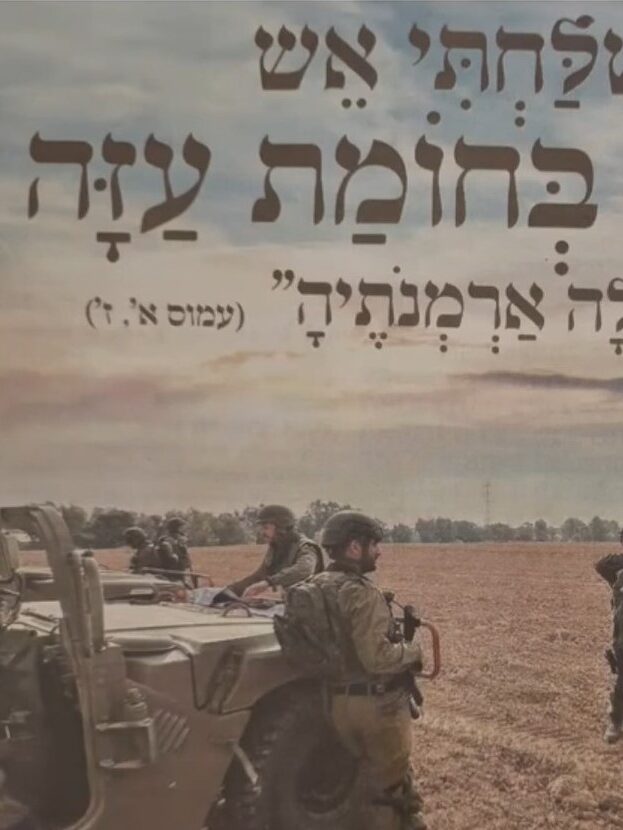23 Lectures
-
Azza – lecture 1
Introduction to Azza: What is the importance of Azza in the Tanach? and throughout Jewish history? The special phrase – “Ad Azza” (until Azza), used in the Tanach so many times, indicates that Azza was always a physical and spiritual barrier against Israel.
-
Azza – lecture 2
The name “Azza” – what does it mean? Is it from “עוז” (Oz), meaning – positive strength? or is it from “עז/עזות” (Az/Azut), meaning negative aggressivness? Going over the Tanach, will give us an interesting insight on the nature of Azza.
-
Azza – lecture 3
The main story about Azza in the Tanach – is about Shimshon (Samson). Chazal (the Sages) say that Shimshon’s downfall begins and ends in Azza? Why? To what extent is God connected to Shimshon? We will start analyzing the first story – Shimshon’s riddle, and raise important questions about Shimshon’s relationship with his parents and about the riddle itself.
-
Azza – lecture 4
In this lesson, we will understand how the riddle with the lion is the key to understanding Shimshon’s mission. His plan to save the people of Israel from the Philistines is explained through the riddle. The lion, the honey, the bees – they are all symbols in his great plan. And he kept it a secret from his parents to express the fact that the people of Israel were not yet ready and that he would need to act alone.
-
Azza – lecture 5
We will learn another interpretation of Shimshon`s riddle – according to which the lion symbolizes Judah, and he was supposed to understand the message: to connect to the tribe of Judah. When Shimshon finally reaches the tribe of Judah, they… turn him over to the Philistines. We will ask if this is a permissible action according to Jewish law? And we will argue that this event was the breaking point of his mission.
-
Azza – lecture 6
Shimshon and the Tribe of Judah: Was he trying to recruit them? Why did they turn him over to the enemy? Judah`s actions express the deep reason for Shimshon’s (and the entire nation of Israel’s) downfall at the hands of the Philistines: lack of unity. We will see sources in the Quran that emphasize how the lack of unity in Israel is the key to victory over them. We will discuss the painful current implications of this message.
-
Azza – lecture 7
Shimshon uproots the gates of Gaza, and brings them to the mountain overlooking Hevron. What does this symbolize? We will examine 2 different interpretations: Is Shimshon still strong and active as before, or has he lost his motivation because of the lack of unity in the people.Is bringing the gates to the mountain overlooking Hevron a call for the people of Judah to join him or is it an expression of his discouragement, but also a symbol of a future victory over the Philistines, when the nation will finally unite?
-
Azza – lecture 8
Jacob’s Blessing to the Tribe of Dan – how is it Related to Shimshon and the Gates of Gaza? Our difficulty with the “Gates of Azza” continues even after the establishment of the state of Israel. We will get to know Kibbutz Nahal Oz, near the border with Azza, and hear the eulogy of Defense Minister Moshe Dayan after Roi Rothberg was murdered there. He, too, mentions the “Gates of Azza.” And we will end with the words of one of the residents of Nahal Oz today (2023), after surviving the massacre on 7/10. He also mentions the “Gates of…
-
Azza – lecture 9
We will analyze the story of Shimshon and Delilah. We ask – who was Delilah? Was she a Philistine or a Jew? We will provide several proofs, from maps of the land and from the description of the Bible itself – that she was actually Jewish! What does this teach us about the situation in Judah? We will move on to Shimshon ‘s death – and delve into the famous expression: “Let me die with the Philistines.” We will see the meaning of this expression – according to the Sages and in modern Hebrew.
-
Azza – lecture 10
Why was the phrase “Let me die with the Philistines” used in the Defense Minister’s assessment of the situation during the Yom Kippur War in 1973? We will ask questions about the story of Shimshon’s death: Why did he commit suicide? Why does it sound like a personal revenge? Why is it mentioned again that he judged for 20 years? What does “(One) revenge for (one of) my two eyes” mean? And we will delve deeper into the question of suicide – is it permissible according to Halacha?
-
Azza – lecture 11
The big question: What does the Bible teach us, through the story of Shimshon, about the way to overcome Azza? The answer depends on another big question: Is Shimshon a positive and righteous figure? Or a negative figure who failed? These two possibilities are already seen in two interpretations of Jacob’s blessing to the tribe of Dan. We will begin to see both directions in understanding the story of Shimshon, and we will provide evidence from the story for both opinions.
-
Azza – lecture 12
We study sources that support the positive interpretation – Shimshon was a great righteous man, who did all his deeds for the sanctification of God. His sins were small and his death was heroic. The big questions about this reading: What is the Bible teaching us through his character? We will see three approaches that offer an educational, religious and personal message. But how do such messages connect to the cycle of the Book of Judges? And to the overall message of the Book of Judges? And finally – how does this teach us how to deal with Azza?
-
Azza – lecture 13
The opposite approach: Shimshon’s image is negative, he brought destruction and ruin to Israel and he brought about the tragic end of the period of the Judges! This approach is much more in line with the overall message of the Book of Judges. Which is: “In those days there was no king in Israel, every man did what was right in his own eyes”. We will see how the story emphasizes that Shimshon himself “Did what was right in his own eyes”. We will delve deeper into this expression – and study its references in the Torah and the Bible.
-
Azza – lecture 14
The phrase “In those days there was no king in Israel” implies that the central problem was the lack of a king. Is that true? We will review the three stories at the end of the Book of Judges: the story of Shimshon, the statue of Micah, and the story of the concubine in “Givah”. The central problem is – that everyone behaved as individuals and did not look at the nation as a collective, this is the true meaning of “there was no king in Israel; every man did what was right in his own eyes.”
-
Azza – lecture 15
What does Devorah the prophetess have to say about Torah Scholars who don’t join the war effort? and about some tribes which do not take part? This fits a general theme in the book of Judges: the tribes think only about themselves and not about national needs. We will see how this theme is expressed throughout all the difficult stories at the end of the book, and how the lack of a sense of national responsibility leads to major sin.
-
Azza – lecture 16
Exploring the concept of “Unity” in the Tanach. Where does the term “כאיש אחד” (as one person) appear? surprisingly, it appears a few times in the story of “Pilegesh Be-Givah”! But where else? And how is this term connected to the term opening the book of Shmuel – “ויהי איש אחד”? We will try to better understand the story of “Pilegesh Be-Givah”, and what we can learn about Jewish unity today (2024) and its importance regarding the war in Azza.
-
Azza – lecture 17
What is keeping us, throughout history, from controlling Azza? Is it the lack of unity? Surprisingly, in the story of “Pilegesh Be-Givah”, the people of Israel actually were united! The Bible’s relevant answer is related to the “day after” the war and drawing conclusions from the difficult events. An interesting comparison between “Pilgash Be-Givah”, and Parshat “עיר הנידחת” (idolatrous city) can perhaps give us a new meaning to the verse: “There is no king in Israel”.
-
Azza – lecture 18
“Beyahad Nenatzeach” (ביחד ננצח) Is unity sufficient for victory? The Prophet Shmuel’s problem with the demand for a King: a problem of timing. Why was the timing wrong? Why do we always want things to happen – NOW!…and why does that prevent us from going through a real process of “Teshuva” (repentance)?
-
Azza – lecture 19
Why did Shmuel the Prophet oppose the appointment of a king? What was the main problem in all the stories at the end of the Book of Judges? What is the true meaning of the recurring verse: “In those days there was no king in Israel”? And what is the important message from all of this for Israel today (2024)?
-
Azza – lecture 20
Shimshon’s suicidal death- what did he achieve? Why did Hashem agree to his suicide, and restore his strength? What can we learn from Shimshon about the purpose of the war against Azza, today (2024) ? The “Samson Option” – how does this influence our policy vis-a-vis Iran and nuclear weapons?

